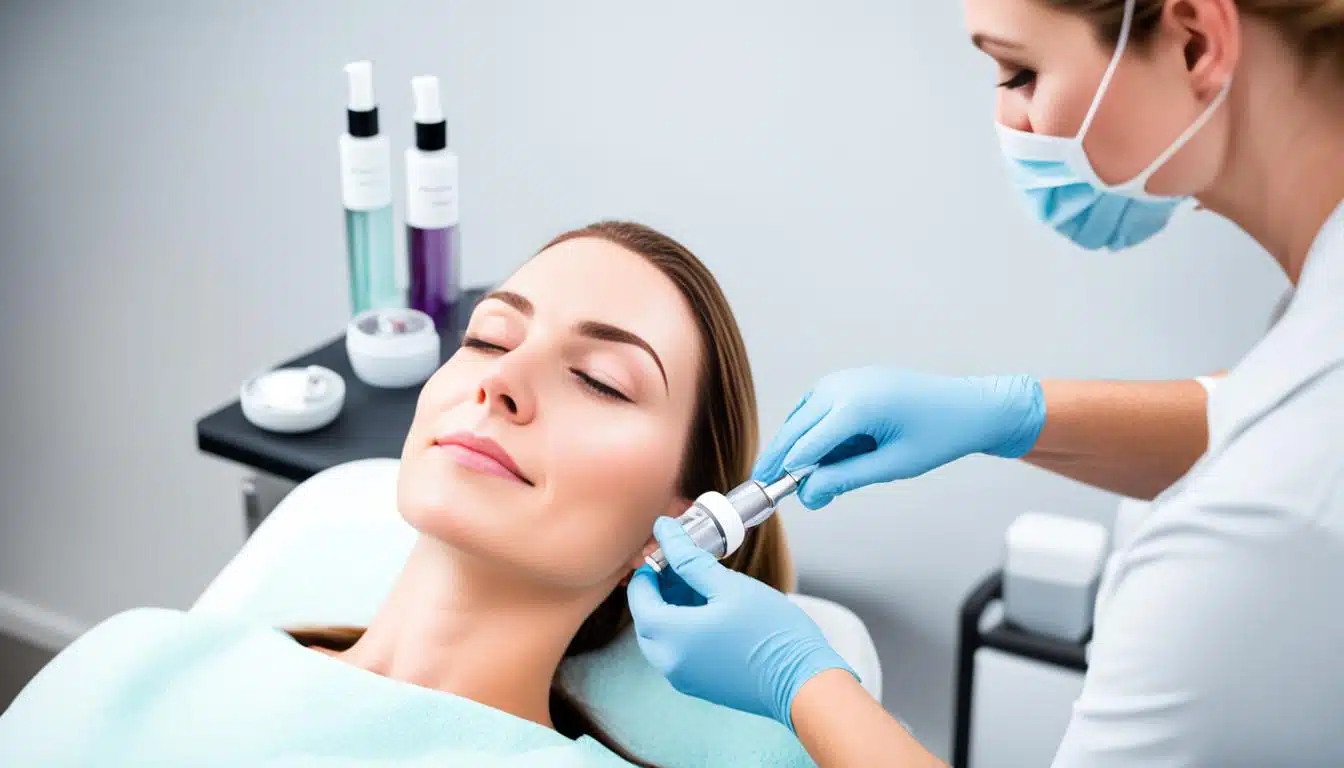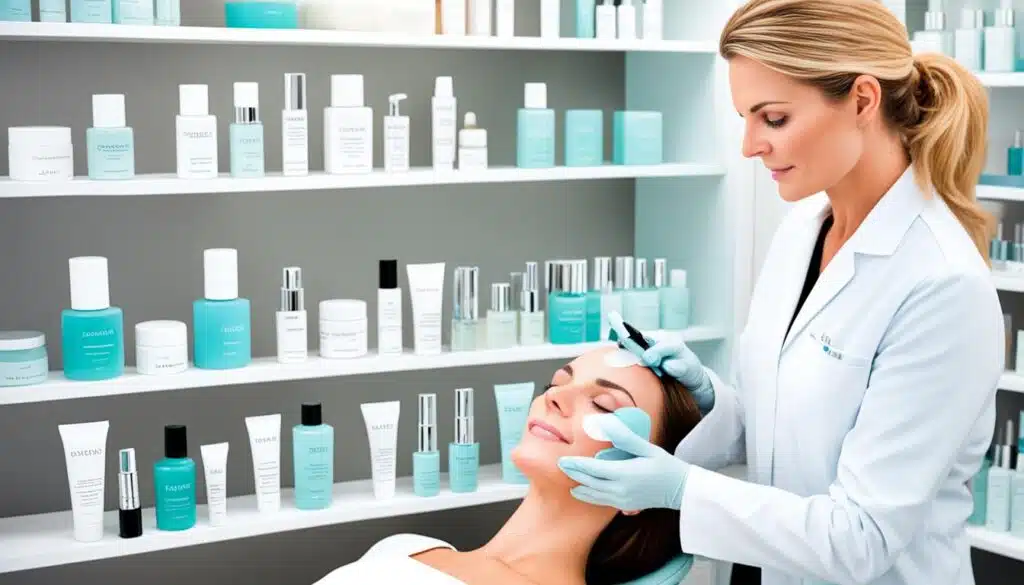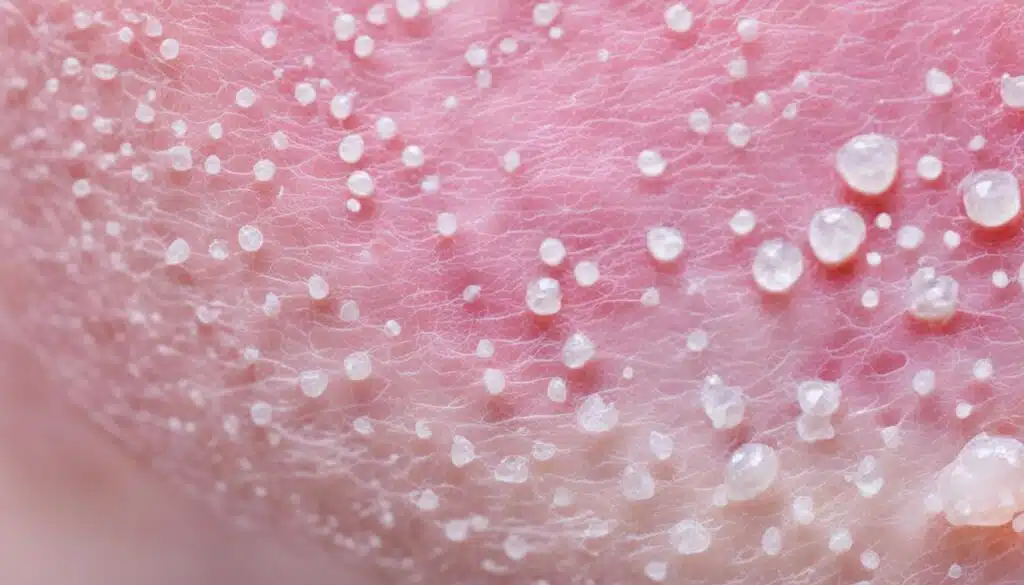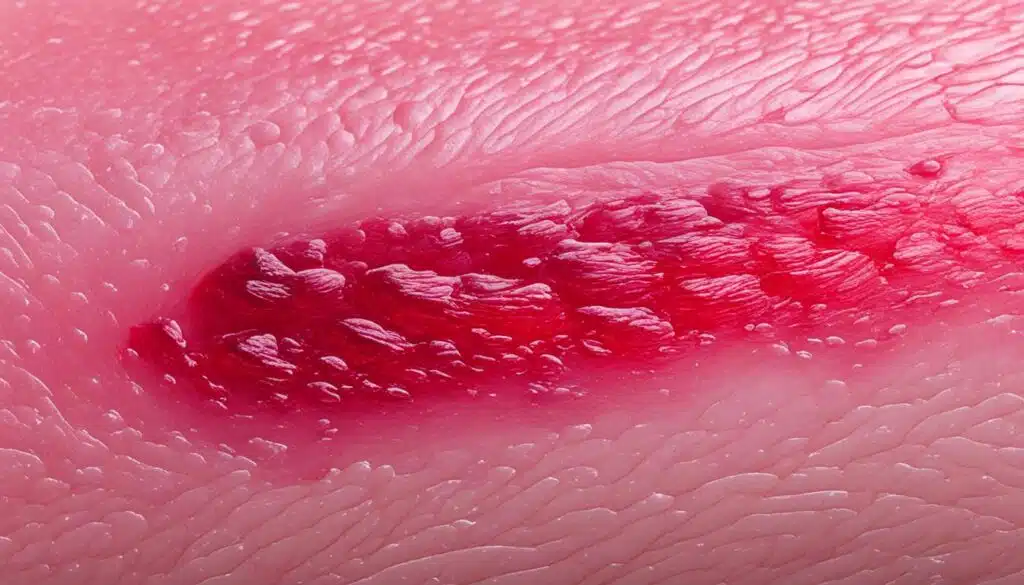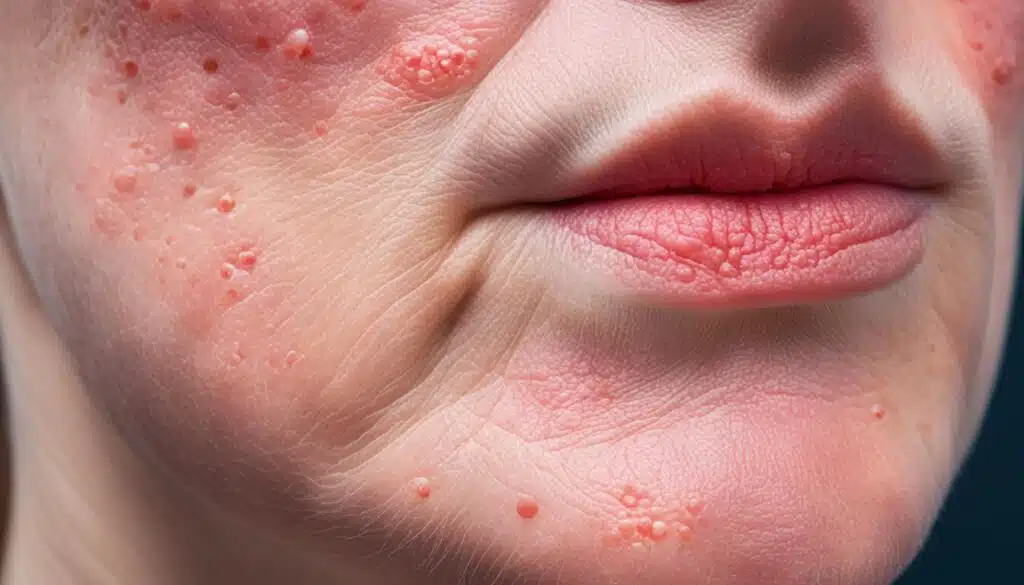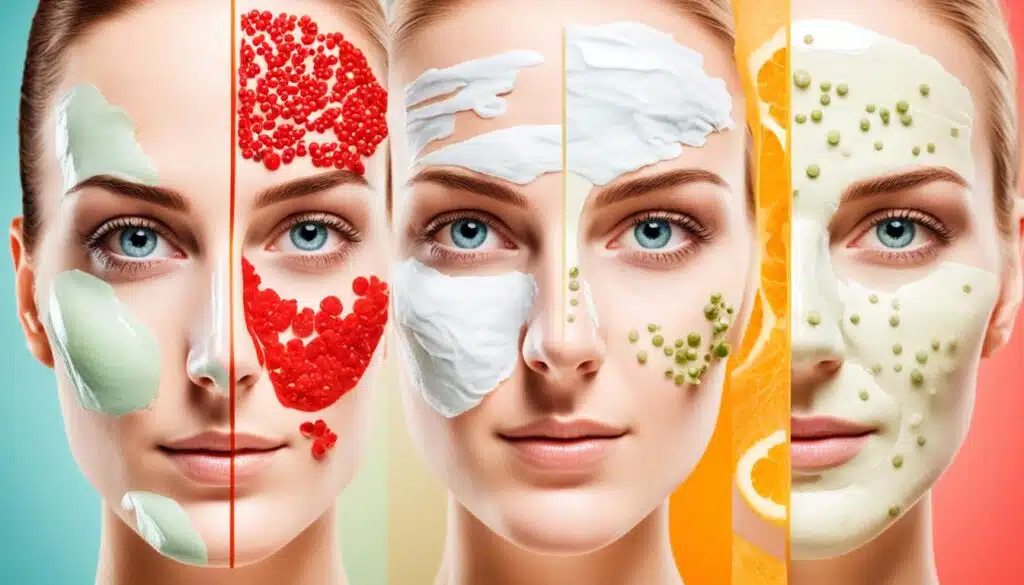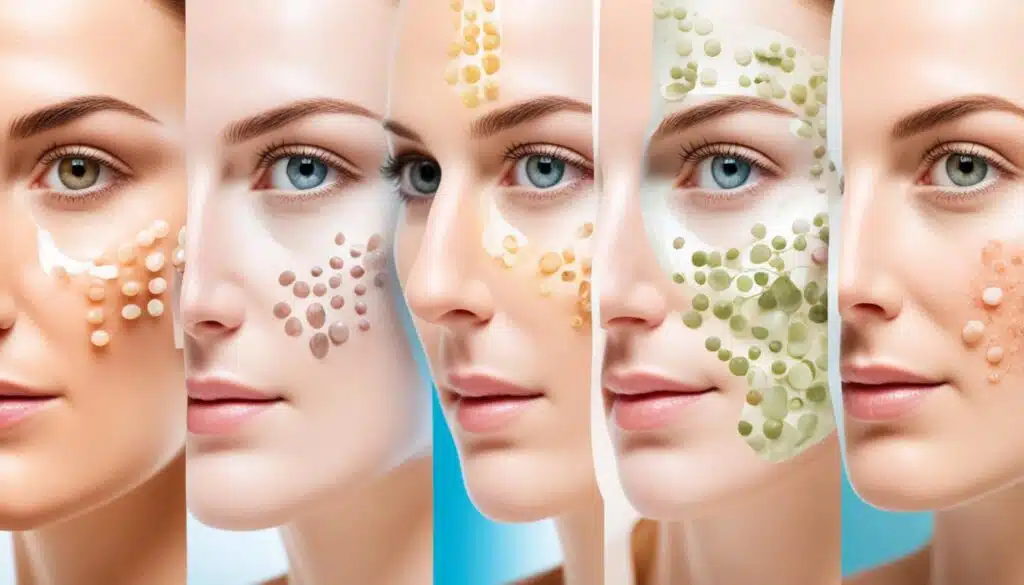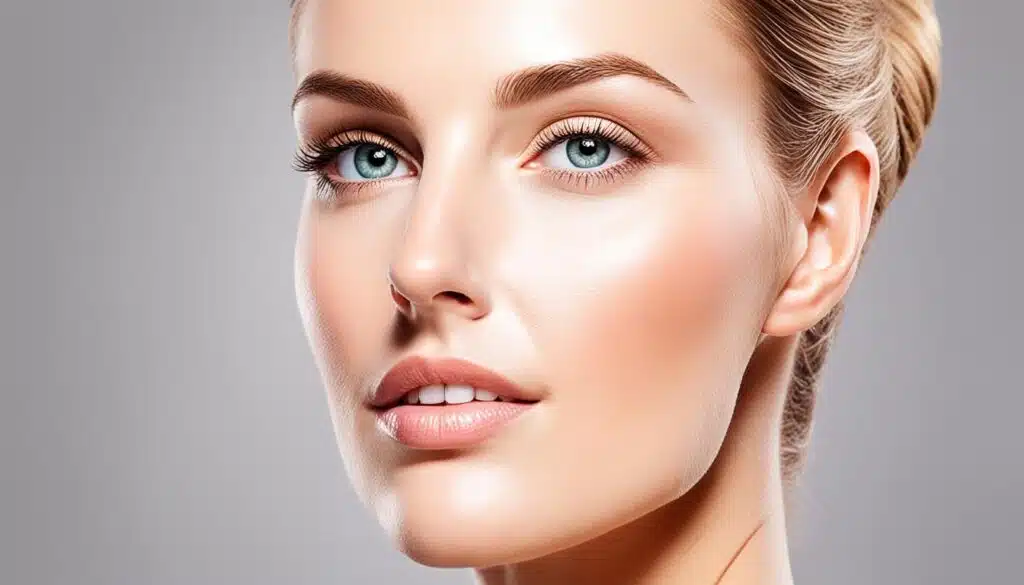As an esthetician, you help people with their skin. You can treat acne and blemishes using your skills and the right products. Estheticians make custom plans to make skin look and feel better.
Hale & Hush’s Rare Mandelic Serum is a top choice. It uses mandelic acid to smooth skin, improve brightness, and fade scars. Skincare brand Circadia has special cleansers, like one with Salicylic Acid, to tackle acne. Others help get rid of blackheads and blemishes.
Have you heard of Circadia’s Serum 71? It boosts your skin’s defense and fights redness. It’s packed with good stuff like mandelic and azelaic acids. This serum is from a line of products that fight acne and dark spots.
Key Takeaways
- Estheticians are licensed professionals who specialize in providing a wide range of skincare treatments and services.
- Estheticians can recommend personalized skincare products and regimens to address specific concerns like acne and blemishes.
- Advanced esthetician treatments, such as facials, extractions, chemical peels, and microdermabrasion, can be particularly beneficial for managing moderate to severe acne.
- Estheticians stay up-to-date on the latest industry research and techniques to ensure they are providing effective, evidence-based solutions for their clients.
- Consulting with a licensed esthetician can help improve the overall health and appearance of the skin, reducing the severity of acne and minimizing the appearance of related scarring and hyperpigmentation.
Understanding Acne
Acne is a skin problem that happens when your skin’s oil glands get infected or inflamed. This causes different types of pimples to show up on your skin. Knowing what causes acne helps us treat it better.
Types of Acne
There are three main types of acne: non-inflammatory, inflammatory, and cystic. Non-inflammatory acne are blackheads and whiteheads. They form when oil, dead skin, and germs block your pores. Inflammatory acne includes red, tender bumps and pimples, often filled with pus. Cystic acne is the most severe, causing deep, painful lumps.
Causes of Acne
Many things can cause acne. These include changes in hormones, too much oil on the skin, dead skin cells, and bacteria. For instance, hormonal shifts during the menstrual cycle can up oil production, leading to acne.
Factors Contributing to Acne
Things like a bad diet, different weather, not taking care of your skin, and some medicines can make acne worse. Stress is also a big issue because it messes with hormones and can cause more inflammation.
The Role of Estheticians
Estheticians, or skin care specialists, are pros who give lots of skincare treatments. They help with issues like acne. After looking closely at the skin, they suggest special products and routines to tackle worries. They’re skilled in advanced procedures such as facials, extractions, and more. These can really make a difference if you have bad acne.
Skin Analysis and Product Recommendations
Estheticians check a person’s skin thoroughly. They look at the type of skin and what the person wants. With this info, they pick the right products and routines to fix problems like acne or spots. Through these personal regimens, they help their clients keep their skin glowing and healthy every day.
Advanced Treatments for Acne
Besides custom product picks, estheticians do lots of advanced treatments. These can really help with acne. They offer facials, extractions, and more to fight off acne and keep the skin looking good. By using these techniques, they enhance the skin’s health and appearance, dealing with specific acne issues too.
Esthetician Treatments for Non-Inflammatory Acne
If you have non-inflammatory acne like blackheads or whiteheads, estheticians can help. They use special treatments to clear your skin. By removing oil, dead skin, and dirt from your pores, they stop new spots from forming.
Treating Blackheads and Whiteheads
Estheticians are experts at removing blackheads and whiteheads safely. They use special tools and techniques to make your skin look better. This includes chemical peels and exfoliation, making your skin smoother and more glowing.
Recommended Skincare Routines
Keeping up with treatments is important. Estheticians will show you how to take care of your skin every day. A gentle cleanser, exfoliating toner or serum, and oil-free moisturizer are often recommended. Cleaning and moisturizing daily will help keep your skin clear.
Esthetician Treatments for Inflammatory Acne
Inflammatory acne is not just any pimple. It includes papules, pustules, and nodules. Estheticians know how to treat it well. They often start with special extractions using safe techniques. This helps clean out the oil, dead skin, and germs causing the pimples.
Addressing Papules, Pustules, and Nodules
For those angry red pimples, estheticians have special tools like high-frequency devices. These tools lessen the redness and swelling. They also help the skin heal. Sometimes, they might suggest chemical peels to clear the pores or retinoid creams to speed up the healing process.
Professional Extractions
Taking matters into your own hands with cystic pimples can end badly. It often leads to more pain, infection, or scars. Estheticians are skilled and use the right tools to do extractions safely. This reduces any hurt and boosts the look of your skin.
Recommended Skincare Routines
Everyday skincare for inflamed acne is key. A simple, strong cleaner, specific serums, and a light moisturizer are often advised. This regimen cleans, treats, and hydrates the skin. It’s vital for helping the skin heal on a daily basis.
Esthetician Treatments for Cystic Acne
Cystic acne is the most severe form of acne. It’s painful, with deep, hard, and tender nodules or cysts occurring under the skin. This type of acne is hard to treat and can cause scarring and inflammation if not managed well.
Understanding Cystic Acne
Cystic acne happens when our skin’s oil glands get very clogged. This then forms deep, pus-filled cysts that hurt to touch. These cystic breakouts can’t be treated at home. They need professional treatments to get better.
Avoiding DIY Extractions
Trying to pop cystic acne at home can make things worse. It can cause more irritation, infection, and scarring. Estheticians know how to safely pop pimples. They use proper tools to reduce risks.
Recommended Skincare Routines
For cystic acne issues, estheticians often suggest a daily skincare plan. This includes using a soft cleanser, targeted serums or treatments, and a moisturizer that doesn’t clog pores. Such a routine can lessen inflammation, promote healing, and stop breakouts.
Estheticians also offer special professional treatments. This could involve using high-frequency devices to cut down inflammation and speed up healing. Working with a licensed esthetician can lead to smoother and healthier skin. It also lowers the chance of serious scarring.
Esthetician: The Skin Care Experts
Estheticians, or skin care specialists, are licensed professionals. They offer a broad range of skincare treatments and services. Their goal is to enhance skin health and look. They handle tasks like facials, extractions, chemical peels, microdermabrasion, waxing, massage, and makeup application.
They’re experts in understanding skins. They suggest specific skincare routines for each person. Plus, they offer tailor-made solutions for problems like acne.
| Esthetician Services | Description |
|---|---|
| Facials | Customized treatments to cleanse, exfoliate, and nourish the skin |
| Extractions | Removal of blackheads and whiteheads to unclog pores |
| Chemical Peels | Exfoliating treatments to improve skin texture and tone |
| Microdermabrasion | Mechanical exfoliation to resurface and rejuvenate the skin |
| Waxing | Hair removal services for the face and body |
| Massage | Techniques to relax and promote circulation in the skin |
| Makeup Application | Artful application of cosmetic products to enhance the complexion |
Estheticians are skilled at analyzing skin. They give out skincare routines made just for you. They also come up with unique ways to treat skin issues like acne.
Holistic Approach to Acne Management
Alongside getting professional skin treatments, a holistic approach acne management focuses on lifestyle habits. Ways to cut stress like workout, enough sleep, and chilling out can even out hormone levels. It also reduces inflammation, a big cause of acne flare-ups.
Lifestyle Changes
Changing your daily habits, like regular workout and proper sleep, is key to handling acne. These changes balance your hormones and fight off inflammation, cutting down on breakouts.
Stress Reduction Techniques
Good stress management, including mindfulness and meditation, is vital for handling acne. By keeping stress in check, you regulate hormones and stop the inflammatory cycle that makes acne worse.
Diet and Hydration
Watch what you eat, avoiding too much dairy and quick carbs, and stay hydrated. These changes can help control your acne. Adding probiotics to your meals also boosts skin health.
Professional Credentials and Training
To gain a license, estheticians finish a state-approved program and ace both written and hands-on exams. The program includes over 600 hours of study. They learn about skin, picking the right products, and how to perform facials.
State Licensure Requirements
To become estheticians, they must meet certain needs set by each state. This usually means the following:
- Completing a recognized esthetician program
- Passing the state’s written and practical exams
- Getting a valid esthetician license
- Following the state’s cosmetology laws and rules
Continuing Education
After getting their license, estheticians continue to learn new things. They take classes to know the latest skin care procedures and products. By doing this, they provide better service to clients.
| Credential | Requirements | Importance |
|---|---|---|
| Esthetician License | Completion of state-approved training program, passing written and practical exams | Makes sure estheticians are well-trained to give safe and good treatments |
| Continuing Education | Take ongoing classes and workshops to learn new trends and skills | Helps estheticians improve and provide top-notch service to clients |
| State Licensure and Regulation | Follow their state’s cosmetology laws and requirements | Keeps estheticians professional and working legally |
Customized Skincare Plans
Estheticians are skin care experts who design personalized plans for every client. They look closely at a person’s skin type, issues, and what they want to achieve. This involves doing deep consultations and skin analysis.
They then suggest specific product recommendations and treatments. This helps with everything from managing acne to dealing with other skin problems.
Personalized Consultations
At the start, estheticians talk a lot with their clients. They aim to fully grasp the client’s skin, lifestyle, and dreams for their skin. This is done through asking lots of questions and checking the skin closely.
After this, they come up with a complete plan. It’s specifically for that client’s skin concerns and goals for their skin.
Research-Based Information
Estheticians always keep up with research and the best ways to solve skin problems. They focus on using evidence-based methods to tackle issues like acne. This helps them give smart product recommendations and treatments.
The Benefits of Professional Esthetician Treatments
Seeing a licensed esthetician can be a game-changer for those struggling with acne and other skin issues. They are skilled in using special methods and cures to handle acne. This can lower the impact of breakouts and stop new blemishes.
Also Read : Jet Set Glow: Skincare Tips For Traveling Essentials
Effective Acne Management
Estheticians excel in dealing with acne from its core. Their professional treatments target issues like scarring and hyperpigmentation. This leads to smoother, more evenly toned skin.
Reduced Scarring and Hyperpigmentation
Estheticians’ use of advanced techniques can fade past acne signs. This includes scarring and hyperpigmentation. They work to bless clients with younger, glowing skin.
Improved Skin Health and Radiance
Getting regular treatments from an esthetician can truly transform your skin’s health and look. They craft unique skincare and treatments just for you. This can make your complexion clear and radiant, boosting your mood and confidence.
Conclusion
Estheticians are vital in skincare, aiding people with issues like acne. They are trained uniquely with advanced methods. This lets them offer real solutions for better skin health and appearance. They work closely with clients to create custom skincare plans. They also give high-quality treatments. This results in clearer, brighter skin and boosts confidence.
Treating acne and blemishes, reducing scars, and making skin healthier is key. Estheticians’ knowledge helps their clients get the skin they dream of. They do this through expert professional treatments.
Estheticians truly are crucial in the skincare field. Their tailored, fact-based methods are key in handling various skin issues. They also promote self-confidence. The need for esthetician services is growing. Their skills are essential for healthy skin.
FAQs
Q: What is the difference between esthetician and dermatologist?
A: Estheticians specialize in skincare treatments, while dermatologists are medical doctors who diagnose and treat skin conditions.
Q: How do I become an esthetician?
A: To become an esthetician, you must complete an esthetician program approved by the state board and obtain a state license.
Q: What kinds of treatments do estheticians perform?
A: Estheticians perform a wide range of services, including facials, extractions, chemical peels, and other skincare treatments.
Q: Can estheticians specialize in specific skin conditions?
A: Yes, estheticians may choose to specialize in treating specific skin conditions such as acne, aging skin, or hyperpigmentation.
Q: Do estheticians work in spas or salons?
A: Yes, estheticians work in various settings including spas, salons, day spas, and medical spas.
Q: What is the career outlook for estheticians?
A: According to the Bureau of Labor Statistics, the employment of skincare specialists, including estheticians, is projected to grow in the coming years.
Q: Is a cosmetology school the same as an esthetician program?
A: No, while both focus on beauty and skincare, cosmetology programs cover a broader range of topics including hair and nails, whereas esthetician programs specialize in skincare treatments.
